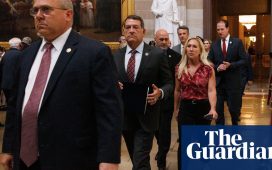The supreme court has blocked Donald Trump’s bid to end the so-called Daca program that allowed more than 650,000 undocumented immigrants, who were brought to the US unlawfully as children, to live and work in the US without fear of deportation.
The Trump administration announced in September 2017 that it planned to scrap the Deferred Action for Childhood Arrivals (Daca) program created by the Obama administration to give temporary, renewable protection to these young people nicknamed Dreamers.
Trump’s decision immediately threw Dreamers into turmoil and fear, while also triggering a legal battle that wound up in the supreme court last year and led to this June 2020 decision. The program has been in limbo since the 2017 announcement.
Here’s what you need to know.
What is Daca?
Daca (pronounced dah-kuh) is a federal government program created in 2012 under Barack Obama. It allowed people brought to the US unlawfully as children the temporary right legally to live, study and work in America, instead of living in the legal shadows, fearing deportation. Those applying were vetted, and then action to deport them is deferred for two years, with a chance to renew on a rolling basis, and they become eligible for basics like a driving license, college enrollment or a work permit. The program is not designed as a path to permanent residency or citizenship.
Who are the Dreamers?
Those protected under Daca are known as “Dreamers” – by the time Trump announced his decision to rescind the program, many hundreds of thousands had been granted approval. To apply, they must have been younger than 31 on 15 June 2012, when the program began, have arrived before the age of 16 and been “undocumented”, ie lacking legal immigration status. Most Dreamers are from Mexico, El Salvador, Guatemala and Honduras.

Why are they called Dreamers?
Daca was a compromise devised by the Obama administration after Congress failed to pass the Development, Relief and Education for Alien Minors (Dream) Act, which would have offered the chance of permanent legal residency. The bipartisan act was introduced in 2001 and has repeatedly failed to pass.
What did Trump announce in 2017?
During the 2016 election, Trump promised to rip up Daca immediately and also make the deportation of the US’s estimated 11 million undocumented persons a top priority, as part of his hardline platform on both legal and illegal immigration.
In September 2017, the government said it would phase out Daca, but gave Congress six months to come up with a legislative solution, which it failed to do. Because Obama created the Daca program as an executive policy decision, Trump had the power to simply reverse the policy.
What’s been happening to the Dreamers?
After the 2017 announcement the program was phased out. People who did not have the protection were given a few days to apply for it and there was a deadline for people to renew existing protections. Separately, some states and colleges stepped in with some support. People who didn’t apply or renew became vulnerable to deportation, with the added risk that they were now easier for the authorities to track down. It’s not known who may have suffered this fate.
What happens now?
The case before the supreme court hinged on whether the Trump administration followed proper procedure – not whether it could legally end Daca. The court agreed Trump has the power to end the program.
That leaves open the possibility that Trump could have another go at scrapping it, though it would be difficult to do before the November election – and largely unpopular with voters. So Daca survives, albeit still in limbo for now. Will it start back up again, allowing new applications?
If the program had been killed off, Dreamers faced the immediate threat of deportation to the countries where they were born but many have no familiarity with.
Joe Biden has pledged to make Daca permanent via legislation if he becomes president.






